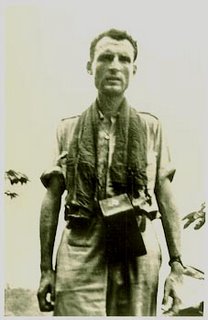 Eyewear is very glad to be able to feature a poem from such a fine poet as Nathaniel Tarn, pictured above. It first appeared, in print, in The Poker, edited in Boston by Dan Bouchard of MIT and then in the book Recollections of Being from Salt (2004). It seems all-too relevant again today.
Eyewear is very glad to be able to feature a poem from such a fine poet as Nathaniel Tarn, pictured above. It first appeared, in print, in The Poker, edited in Boston by Dan Bouchard of MIT and then in the book Recollections of Being from Salt (2004). It seems all-too relevant again today.Tarn is a poet, translator, critic, anthropologist. He has led a distinguished literary and academic career studying and/or teaching at the Universities of Cambridge, Paris, Chicago, London, SUNY Buffalo, Princeton, Pennsylvania, Colorado and Jilin (P.R.C.). Among some 35 books are The Beautiful Contradictions (Random House); Lyrics for the Bride of God (New Directions) and Selected Poems: 1950-2000 (Wesleyan).
He was founding editor of Cape Editions & Cape Goliard, London-New York, in the late Sixties. He lives near Santa Fe, New Mexico.
from: War Poems Yet Again
3] The Asphyxiation
Needful, while it is taking place,
that the process be invisible
both to the executioner and to the victim.
"For now, let’s say the victim is your honor,
the judge-role done with and the robe burned.
Guerilla war is universalized: the whole world
is the menace now, we see the enemy
at every gatepost: our law alone is
liberation." Kerchief, or gag, whatever,
to be as black as blackest ink,
whole face as well covered in tulle,
this black of course – as in those plays
where scene-shifters don black to sign “invisible.”
Interrogator, interrogators, to be most normal folk
such they could be exchanged for any other folk
and no one, [none, no one], would ever be
so much the wiser. Sitting
most days in offices, filing bland duties
like mostly paperwork and such banality.
All this though all the prisons melted down:
the world may witness we are white as sheep.
No one in town to know the difference
one way or either. So that, to go to town, to greet
one’s friends implies the occultation of the strangled
scream inside the throat that swallowed gag or kerchief
in the act of living. And you say “fine,” yes, “fine thanks,”
[“fine” again and always “fine”] until the end of publication.
“How are you doing this fine morning?” “-Fine, how are you?”
the language plumbs the depths of idiocy
hoping you all and sundry will make “enjoy your day.”
The eye of judgment sits the Adam’s apple,
continues unrecorded in any document.
And you go home to swallow time
as if, on the first day, you’d swum the sea
to find on coral reef the last of judgment
with throat now free of all encumberment
since you had mastered the asphyxiation.
poem by Nathaniel Tarn
Comments